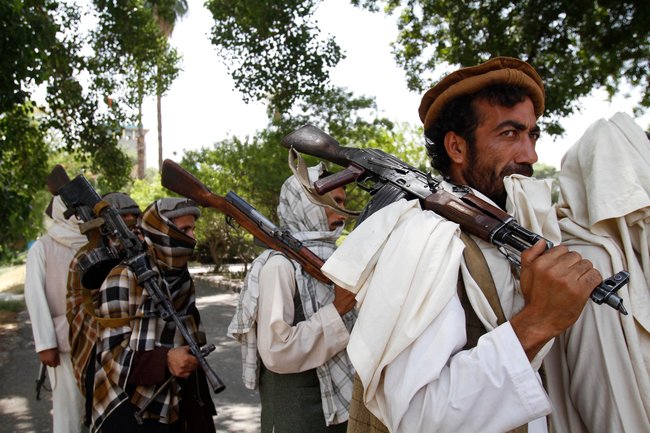High_Gravity
Belligerent Drunk
Taliban Hint at Interest in Negotiated Settlement

http://www.nytimes.com/2011/08/04/world/middleeast/04afghanistan.html?ref=middleeast

KABUL, Afghanistan The Taliban have begun to send signals that they are interested in a negotiated settlement, potentially offering an opening for the West and the Afghan government, several Western officials said.
While there have been some meetings between the Afghan government, NATO officials and some Taliban figures and even with someone who turned out to be a Taliban imposter the Taliban have always insisted that NATO troops would have to leave Afghanistan before any meaningful negotiations could take place. Now two recent statements suggest instead that they would be willing to engage in talks even with foreigners in the country. The Taliban are also speaking in less inflammatory terms.
The Taliban shift comes even as Afghan public opinion has grown increasingly skeptical about the viability of peace talks in recent weeks, Western officials said. Under the best of circumstances, it will likely take years for a deal to be reached, but many Afghans and Westerners believe that the parties need to start talks before the United States begins to draw down substantial numbers of troops.
The Talibans public position has undergone an evolution, said Staffan de Mistura, the United Nations special representative to Afghanistan, citing a United Nations analysis of Taliban statements since January, including one on July 28 posted on the Talibans Alemarah Web site. They are becoming politically engaged. The analysis was shared Wednesday with senior diplomats in Kabul.
A Taliban spokesman, Zabiullah Mujahid, confirmed that the article had been posted, and while he said it did not represent the official position, he reiterated several of the articles points. Arsala Rahmani, a former Taliban higher education minister who is now a member of Afghanistans High Peace Council, said he believed that the posting by the Taliban was part of an effort to show an interest in talks.
I am pretty certain that the Taliban are showing a little bit of flexibility recently, and as far as I have information there is a keenness and willingness from Taliban and among the Taliban ranks for peace, he said.
He added, But we have to prepare the ground first.
The Taliban statement, which describes how to bring an end to the war and how the Taliban will behave, includes this sentence: The Americans and all foreign invading forces should seek a face-saving exit from Afghanistan in understanding with the Islamic Emirate of Afghanistan.
The United Nations analysis notes that this envisages talks specifically about foreign troop withdrawal.
Another statement promises that the Taliban will abide by its commitments to the stability of the region following the withdrawal of foreign forces.
None of this suggests that a peace negotiation is imminent. At this early stage even the most cursory dialogue between the warring parties has the character of Kabuki theater in which shadows of menace and promise loom larger than reality. Still, the Taliban statements appear to be efforts to throw out a line. What comes of them will depend on how they are received.
For now, Afghans remain wary. The Taliban have continued to wage a brutal war that has taken an ever higher toll on civilians 360 were killed in June, according to the United Nations. And the position of Pakistan, which has at the least considerable influence and perhaps complete control of some Taliban factions, has not moved. Pakistan wants to retain power over how postwar Afghanistan is shaped, and it fears talks with the Taliban might undermine its own influence.
Pakistani officials have made many conciliatory statements but have not, for instance, offered to allow the Taliban leadership to leave the country in order to meet on neutral ground with Afghan officials and Western interlocutors, according to Afghan and Western officials. There have been initial talks between Tayeb Agha, a former assistant to Mullah Omar, the Taliban leader, and the Americans, the Germans and the Afghans. Information about those talks was leaked in May, and the publicity was believed to have slowed down discussions, several diplomats said.
http://www.nytimes.com/2011/08/04/world/middleeast/04afghanistan.html?ref=middleeast
